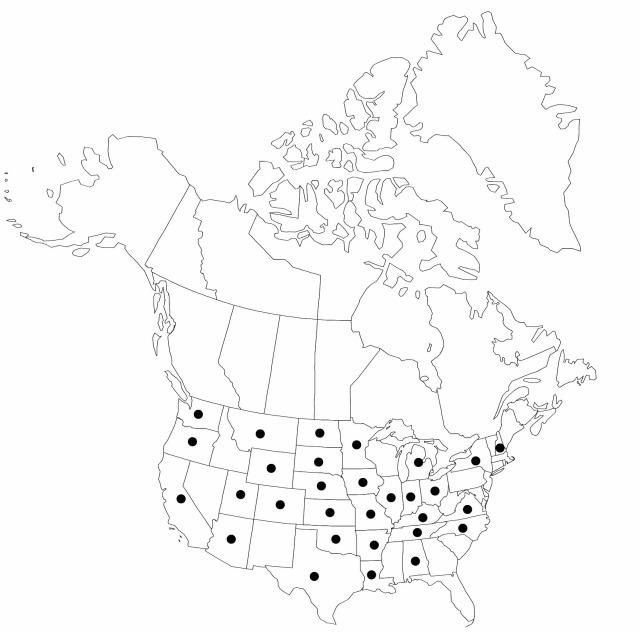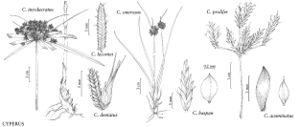Difference between revisions of "Cyperus acuminatus"
Ann. Lyceum Nat. Hist. New York 3: 435. 1836.
FNA>Volume Importer |
FNA>Volume Importer |
||
| Line 11: | Line 11: | ||
|name=Cyperus acuminatus var. cyrtolepis | |name=Cyperus acuminatus var. cyrtolepis | ||
|authority=(Torrey & Hooker) Kükenthal | |authority=(Torrey & Hooker) Kükenthal | ||
| + | |rank=variety | ||
}} {{Treatment/ID/Synonym | }} {{Treatment/ID/Synonym | ||
|name=Cyperus cyrtolepis | |name=Cyperus cyrtolepis | ||
|authority=Torrey & Hooker | |authority=Torrey & Hooker | ||
| + | |rank=species | ||
}} {{Treatment/ID/Synonym | }} {{Treatment/ID/Synonym | ||
|name=Cyperus cyrtolepis var. denticarinatus | |name=Cyperus cyrtolepis var. denticarinatus | ||
|authority=(Britton) Britton | |authority=(Britton) Britton | ||
| + | |rank=variety | ||
}} {{Treatment/ID/Synonym | }} {{Treatment/ID/Synonym | ||
|name=Cyperus rufescens var. denticarinatus | |name=Cyperus rufescens var. denticarinatus | ||
|authority=Britton | |authority=Britton | ||
| + | |rank=variety | ||
}} | }} | ||
|hierarchy=Cyperaceae;Cyperus;Cyperus subg. Pycnostachys;Cyperus acuminatus | |hierarchy=Cyperaceae;Cyperus;Cyperus subg. Pycnostachys;Cyperus acuminatus | ||
| Line 43: | Line 47: | ||
-->{{#Taxon: | -->{{#Taxon: | ||
name=Cyperus acuminatus | name=Cyperus acuminatus | ||
| − | |||
|authority=Torrey & Hooker | |authority=Torrey & Hooker | ||
|rank=species | |rank=species | ||
| Line 58: | Line 61: | ||
|publication year=1836 | |publication year=1836 | ||
|special status= | |special status= | ||
| − | |source xml=https://jpend@bitbucket.org/aafc-mbb/fna-data-curation.git/src/ | + | |source xml=https://jpend@bitbucket.org/aafc-mbb/fna-data-curation.git/src/f50eec43f223ca0e34566be0b046453a0960e173/coarse_grained_fna_xml/V23/V23_233.xml |
|genus=Cyperus | |genus=Cyperus | ||
|subgenus=Cyperus subg. Pycnostachys | |subgenus=Cyperus subg. Pycnostachys | ||
Revision as of 20:06, 16 December 2019
Herbs, annual, cespitose. Culms roundly trigonous, (10–)20–30(–45) cm × 0.4–1.2 mm, distal 1/2 glabrous or infrequently scabridulous. Leaves 2–6(–8), V-shaped or flat, 8–12(–16) cm × 1–2(–4) mm. Inflorescences: heads hemispheric, 7–12(–15) mm diam.; rays 1–3(–5), 0.5–2 cm; bracts 3–6, longest erect to ascending, flat to V-shaped, (1.5–)3–12(–25) cm × 1–2.5(–3.5) mm. Spikelets (15–)25–50(–75), ovoid, compressed, 4–7 × 2–3 mm; floral scales 8–20(–35), laterally yellowish, yellowish green, or light reddish brown, medially light brown or greenish brown, 2-keeled, subtly 1-ribbed, ovate-lanceolate, 1–2 × 1–1.4 mm, apex acute, mucronate, straight to excurved, glabrous or sparsely scabridulous. Flowers: stamen 1; anthers 0.5 mm; styles 0.8–1.1 mm; stigmas 0.5 mm. Achenes brown, stipitate, broadly ellipsoid, abruptly contracted to base, 0.8–1.1 × 0.3–0.4 mm, stipe 0.1 mm, apex acute, tapering to slender beak formed of persistent style base, surfaces papillose.
Phenology: Fruiting summer–fall (Jul–Oct).
Habitat: Wet, often sandy shores and damp, disturbed soils
Elevation: 0–1500 m
Distribution

Ala., Ariz., Ark., Calif., Colo., Ill., Ind., Iowa, Kans., Ky., La., Mich., Minn., Mo., Mont., Nebr., N.H. (introduced?), N.Y. (introduced?), N.C., N.Dak., Ohio, Okla., Oreg., Pa. (introduced?), S.Dak., Tenn., Tex., Utah, Va., Wash., Wyo., Mexico (Coahuila, Tamaulipas).
Discussion
Selected References
None.
